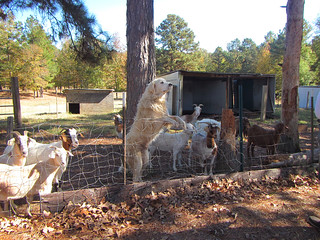Winter predators: Managing your livestock-Part II
All organisms, including predators, need three items for survival – water, shelter and food. Eliminate any one of these, and the organism will leave or perish, he said. Water is not possible to eliminate since your animals need water, too. You can attempt to disrupt predator denning locations and removing shelter, but that may violate state or federal wildlife laws.
Fernandez advises denying predators access to food, namely your livestock. Good fences are an important key to keeping livestock safe. Electric fencing is especially useful against dogs, coyotes and hogs. Place a hot wire about 6 inches off the ground around the perimeter. You may have to add an offset hot wire at the top of the fence to keep coyotes and dogs from jumping over. Additional electric wires may be needed to prevent predators from slipping through the fence. Four-inch square wire can prevent predators from entering property.
Trapping, shooting, poisoning and harassment are common methods of controlling predators. However, all of these methods are coming under increasing public scrutiny and regulation as the general public’s sentiments about animals evolves beyond pets and begins to encompass wildlife. Be careful to closely follow state and federal laws when using one of these methods.
Serious consequences can result from killing protected species or out-of-season game animals. For example, crows, which can injure or maim young livestock, are considered migratory game birds and are protected under state and federal game laws.
Guardian animals help deter predators. Equids, such as donkeys and mules, can be effective against dogs and coyotes. Use equids singly since they will often herd together with other equids leaving the sheep and goats to fend for themselves, Fernandez said. Llamas have been used to deter canine predators. Some llamas will attack canine predators, but they serve primarily as something too large to attack, discouraging the predators.
Livestock guardian dogs have a long history of successful use. Use guardian dogs in pairs at the very least so they can protect each other in a fight, or so one can remain with the livestock while the other intercepts the predator. Three or more dogs are better, since one will stay with the livestock while the other two attack the predators.
For more information about protecting livestock against predators or related questions, contact Dr. Fernandez at fernandezd@uapb.edu or (870) 575-7214.
The Cooperative Extension Program offers all its programs and services (including employment) without regard to race, color, sex, national origin, religion, age, disability, marital or veteran status, genetic information, sexual preference, pregnancy or any other legally protected status, and is an equal opportunity institution.
By Carol Sanders
Cooperative Extension Program
U of A at Pine Bluff
Writer/Editor
UAPB School of Agriculture, Fisheries and Human Sciences
(870) 575-7238
sandersc@uapb.edu
Related Links
